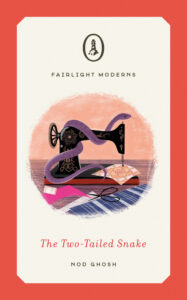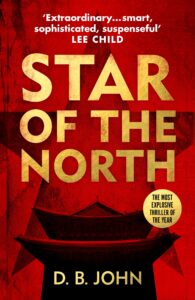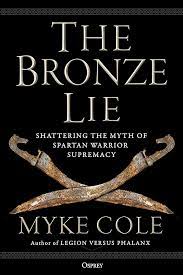My Holiday Reading
On Monday, I honed in on books read during 2023, and at least one of those (Demon Copperhead) squeaked in under the 2023 wire by dint of the recent holiday break.
Over that same break I also read:
1. The Two-Tailed Snake by Nod Ghosh
Historical Fiction / Magical Realism Elements
As recently as November 20 I did a Just Arrived post for Nod’s book, which is set in India at the end of WW2 and through the Independence and Partition era of 1947.

The Two-Tailed Snake also has what I’m calling magical realism elements, in part because folklore is woven into the fabric of the story but also because the storytelling has a flavour reminiscent of traditional fables—again at the folklore end of the spectrum, I hasten to add, rather than moral aphorism.
The story is also a coming-of-age narrative for the protagonist, Joya. Through her eyes, we experience a sequence of events involving family, friends, and community—against the backdrop of momentous historical upheavals—many of which Joya finds mysterious and baffling. Yet although the sequence may appear to contain disparate parts it links, not unlike the snake of the title, into a cohesive whole. One, at 217 pages, that makes for excellent holiday reading.
2. Star Of The North by D.B. John
Thriller
If you like your holiday reading action packed, then consider Star of the North by D.B. John.

Published in 2018 and clocking in at 440 pages, it’s a thrilling read from go-to-whoa. The setting and narrative primarily centre on the tension-filled relations between North and South Korea, but also the US.
The thing I really enjoyed about this book, though, was the cast of fascinating and well-drawn characters, and the extent to which the story draws on actual historical events.
In short (because these are short reports) it’s the best thriller I’ve read in quite a few years, by a long chalk.
3. The Bronze Lie by Myke Cole
Non Fiction / Classical History / Military
Myke Cole is better known to me as a Fantasy and Science Fiction author. I knew he had a military background, however, so I wasn’t entirely surprised to find he’s writing nonfiction as well.

In this case, The Bronze Lie (published 2021) examines the legend of Spartan military supremacy and also the (ahem) spartan nature of their militarized society, with its alleged adherence to archaic virtues, chiefly military honour, religious integrity, and eschewing wealth.
I’ve always been interested in the classical (ca. 4th and 5th centuries BCE) archaic (ca. 800 – 500 BCE) and Mycenean (pre-1100 BCE ca.) Greek eras so already understood enough about Sparta to know that the film 300 is far more fantasy than history.
It’s also been my experience, whenever I delve into a historical period in detail (to whatever extent detail is available), that history is never monolithic, however we may perceive it in retrospect. So I was unsurprised by the subtitle, Shattering the Myth of Spartan Warrior Supremacy and motivated to find out more.
The author’s approach is to work methodically through the (many, near constant) wars Sparta fought through the late Archaic and Classical periods, examining both the Spartan military record, and to a lesser extent the corresponding social structure that supported it. So while the Persian, Peloponnesian, and Theban conflicts were familiar territory, the detail threw new light in many cases.
The level of detail should be of interest to historical and military-history readers, but while I didn’t find it heavy going it’s also not 489 pages of light reading. So you may prefer to keep it for after the holiday rather than packing it as pool or beachside reading. 😀







